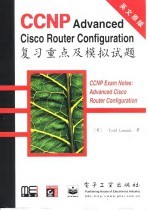图书介绍
CCNP Advanced Cisco Router Configuration 复习重点及模拟试题 英文原版PDF|Epub|txt|kindle电子书版本网盘下载

- (美)Todd Lammle 著
- 出版社: 北京:电子工业出版社
- ISBN:7505357913
- 出版时间:2000
- 标注页数:306页
- 文件大小:14MB
- 文件页数:320页
- 主题词:
PDF下载
下载说明
CCNP Advanced Cisco Router Configuration 复习重点及模拟试题 英文原版PDF格式电子书版下载
下载的文件为RAR压缩包。需要使用解压软件进行解压得到PDF格式图书。建议使用BT下载工具Free Download Manager进行下载,简称FDM(免费,没有广告,支持多平台)。本站资源全部打包为BT种子。所以需要使用专业的BT下载软件进行下载。如BitComet qBittorrent uTorrent等BT下载工具。迅雷目前由于本站不是热门资源。不推荐使用!后期资源热门了。安装了迅雷也可以迅雷进行下载!
(文件页数 要大于 标注页数,上中下等多册电子书除外)
注意:本站所有压缩包均有解压码: 点击下载压缩包解压工具
图书目录
Table of Contents1
Introduction1
Chapter 1 Overview of Scalable Networks1
Describe the key requirements of a scalable internetwork2
Select a Cisco IOS feature as a solution for a given internet-work requirement6
Chapter 2 Introduction to Managing Traffic and Access13
Describe causes ofnetwork congestion14
List solutions for controlling network congestion17
Introduction to Managing Traffic and Access22
Configure IP standard access lists25
Limit virtual terminal access30
Configure IP extended access lists32
Verify access list operation35
Configure an alternative to using access lists39
Configure an IP helper address to manage broadcasts42
Chapter 3 Managing Novell IPX/SPX Traffic47
Describe IPX/SPX traffic management issues48
Filter IPX traffic using IPX access lists53
Manage IPX/SPX traffic over WAN58
Verify IPX/SPX filter operation61
Chapter 4 Configuring Queuing to Manage Traffic67
Describe the need for queuing in a large network68
Describe weighted fair queuing operation70
Configure priority73
Configure custom queuing77
Verify queuing operation80
Chapter 5 Routing Protocol Overview85
List the key information routers need to route data86
Compare distance vector and link-state protocol operation89
Chapter 6 Extending IP Addresses Using VLSMs97
Given an IP address…use VLSMs to extend the use of the IP address99
Given a network plan that includes IP addressing,explain if a route summarization is or is not possible103
Define private addressing and determine when it can be used106
Define network address translation and determine when it can be used108
Chapter 7 Configuring OSPF in a Single Area111
Explain why OSPF is better than RIP in a large internetwork112
Explain how OSPF discovers,chooses,and maintains routes117
Configure OSPF for proper operation122
Verify OSPF operation125
Chapter 8 Interconnecting Multiple OSPF Areas131
Describe the issues with interconnecting multiple areas and how OSPF addresses132
Explain the differences between the possible types of areas,routers,and LSAs135
Configure a multiarea OSPF network139
Verify OSPF operation143
Chapter 9 Configuring EIGRP147
Describe Enhanced IGRP features and operation149
Configure Enhanced IGRP153
Verify Enhanced IGRP operation156
Chapter 10 Optimizing Routing Update Operation159
Select and configure the different ways to control route update traffic161
Configure route redistribution in a network that does not have redundant paths between dissimilar routing processes163
Configure route redistribution in a network that has redun-dant paths between dissimilar routing processes166
Resolve path selection problems that result in a redistributed network170
Verify route redistribution173
Chapter 11 Connecting Enterprises to an Internet Service Provider177
Describe when to use BGP to connect to an ISP178
Describe methods to connect to an ISP using static and default routes,and BGP180
Chapter 12 WAN Connectivity Overview187
Compare the differences between WAN connection types:dedicated,asynchronous dial-in,dial-on-demand,and packet switched services188
Determine when to use PPP,HDLC,LAPB,and IETF encap-sulation types192
List at 1east four common issues to be considered when evaluating WAN services196
Chapter 13 Configuring Dial-on-Demand Routing199
Describe the components that make up ISDN connectivity200
Configure ISDN BRI204
Configure Legacy dial-on-demand routing(DDR)206
Configure dialer profiles212
Verify DDR operation216
Chapter 14 Customizing DDR Operation219
Configure dial backup220
Verify dial backup operation224
Configure MultiLink PPP operation230
Verify MultiLink PPP operation232
Configure snapshot routing237
Configure IPX spoofing240
Chapter 15 Bridging Overview245
Define routable and nonroutable protocols and give an example of each247
Define various bridging types and describe when to use each type249
Chapter 16 Configuring Transparent Bridging and Integrated Routing and Bridging253
Configure transparent bridging254
Configure integrated Routing and Bridging (IRB)260
Chapter 17 Configuring Source-Route Bridging265
Describe the basic functions of source-route bridging(SRB)267
Configure SRB269
Configure source-route transparent bridging(SRT)272
Configure source-route translational bridging(SR/TLB)275
Verify SRB operation280
Chapter 18 Managing AppleTalk Traffic285
Identify potential sources of congestion in an AppleTalk network286
Configure zone filters289
Configure RTMP filters292
Configure NBP filters296
Chapter 19 Configuring T1/E1 and ISDN PRI Options299
Identify channelized T1 and E1 configuration300
Identify ISDN PRI configuration commands304